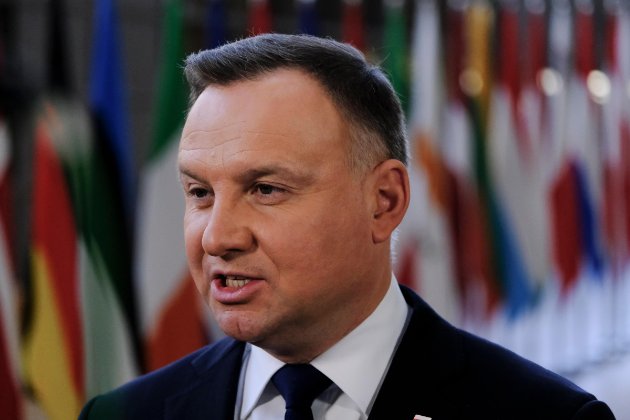Duda Declares July 11 as Day of Remembrance of OUN-UPA Victims: Ukraine’s Reaction
3 July 14:51
Polish President Andrzej Duda has signed a law that establishes July 11 as the National Day of Remembrance of Poles – victims of the genocide allegedly committed by Ukrainian nationalists from the OUN and UPA in 1939-1946. This was reported by the Office of the Polish President, "Komersant Ukrainian" reports
The law was already passed by the Sejm on June 4. In the explanatory note, Polish parliamentarians accuse Ukrainians of “killing more than 100,000 Poles” and forcing “hundreds of thousands” to leave their homes in the east of pre-war Poland.
The main symbol of this tragedy is July 11, 1943, the day when the attacks in the Volyn region peaked.
It is worth noting that Poland had been honoring the victims of the Volyn tragedy every year before, and the date of July 11 was first approved in 2016 as Memorial Day. Now it is an official national date with legal status.
Reaction of the Ministry of Foreign Affairs of Ukraine: it contradicts the spirit of partnership
Ukraine criticized the decision of the Polish authorities. Back in early June, the Ministry of Foreign Affairs expressed regret over the law and called on Warsaw to prevent further aggravation of historical contradictions.
“We call on the Polish side to refrain from steps that could lead to increased tension in bilateral relations and undermine the achievements gained through constructive dialogue and cooperation between Ukraine and Poland,” the Foreign Ministry said in an official statement.
Ukrainian diplomats emphasized that true reconciliation is possible only through mutual respect, joint work of historians and refusal to politicize painful topics of the past.
“Ukraine has consistently advocated for a scientific, unbiased study of the complex pages of our common history. We are convinced that the path to true reconciliation lies through dialogue, mutual respect and joint work of historians, not through political unilateral assessments. Despite the bias and political context of the resolution of the Sejm of the Republic of Poland, we continue to pursue the path of search and exhumation work on the territory of Ukraine and Poland, respectively. We have already achieved practical results on this path, which should continue to develop in the future. We remind you once again that Poles should not look for enemies among Ukrainians, and Ukrainians should not look for enemies among Poles. We have a common enemy – Russia,” the Foreign Ministry said in an official statement.
Historical imbalance: what tragedies Poland does not talk about
The decision of the Polish authorities caused outrage in Ukrainian society. In particular, MP Sofia Fedyna emotionally and reasonably explained in her post why such a step by Poland is painful and politically one-sided.
Sofia Fedyna reminds:
- “In 1944, during the Warsaw Uprising, the Nazis killed about 50,000 Poles in the Wola district alone in a few days.
- In 1937-1938, during the so-called “Polish Operation” of the NKVD, more than 111 thousand Poles were killed.
“But there is no question about them all. But there is a question for Ukrainians who fought for their right to live under the Polish yoke of pacification and dared to dream of their statehood,” Fedyna notes.
Fedyna aptly notes that the wording of the law sounds as if it was taken from the reports of Soviet security officers. Calling the date “the day of the victims of Ukrainian nationalists” is a retranslation of Soviet clichés that were used for decades to destroy any Ukrainian resistance movement.
“This is in the best spirit of the Moscow NKVD. Putin is applauding,” Fedyna added.

It should be noted that recently, President of Ukraine Volodymyr Zelenskyy awarded Polish President Andrzej Duda with the Order of Freedom.
According to the decree, Andrzej Duda received the award for his outstanding personal merits in strengthening Ukrainian-Polish relations, support for state sovereignty and territorial integrity of Ukraine.
The Order of Freedom is the highest state award of Ukraine, which can be conferred on both citizens of the country and foreigners or stateless persons. The award is presented for exceptional services in asserting Ukraine’s sovereignty and independence, developing democracy, and protecting constitutional rights and freedoms.
The Volyn tragedy
The Volyn tragedy is a complex and tragic episode of the Ukrainian-Polish conflict that occurred in 1943-1944 in Volyn during World War II. It concerns the murders of Polish civilians in the Volyn region, which were committed mainly by units of the Ukrainian Insurgent Army (UPA) and local peasants.
At the same time, there were also brutal Polish actions against Ukrainians by the Home Army and Polish self-defense units.
The Volyn tragedy remains a sensitive topic in Polish-Ukrainian relations. Historians from both countries are trying to establish a dialogue, and there are joint commissions. Against the backdrop of Poland’s current support for Ukraine during the war, the topic is less politicized, but remains in the historical memory of both peoples.









